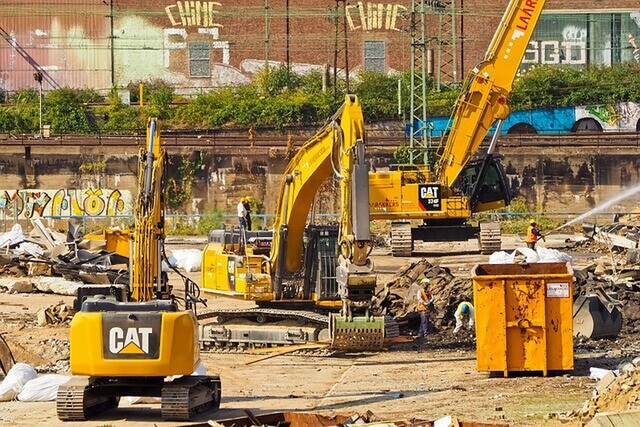Supply chain due diligence in the construction industry
As we covered in our blog “HMRC Warning - Personal Liability for Supplier VAT Fraud”, there are circumstances in which a director of a limited company can be held liable for fraud that has been committed by a third-party supplier.
That may sound pretty harsh - but it’s a fact.
We are now finding that HM Revenue & Customs (HMRC) is taking aim at businesses in the building and construction industry, particularly those involved with the Construction Industry Scheme (CIS) and demanding that they, in effect, take responsibility for the legitimacy of their subcontractors.
And this new focus goes well beyond VAT.
The supply chain due diligence principles have been in place since early 2014 but many contractors believed that verifying the CIS status of their subcontractors (and dealing with them through the Construction Industry Scheme) was sufficient compliance.
The thought process was that HMRC would have done its work in ensuring the legitimacy of businesses that they allow to use CIS.
To be frank, compliance with the supply chain due diligence principles simply didn’t seem to be something that HMRC was hugely worried about. That has now changed.
An increasing number of contractors are being targeted by HMRC and told that they should have gone much further in ensuring that the supply of labour to their businesses was legitimate.
In other words, the contractors should have taken steps to check that individuals employed by subcontractors are being paid the minimum wage, that PAYE and National Insurance contributions are being correctly deducted and paid over to HMRC, that travel and subsistence arrangements are tax compliant and even that the supplier's VAT status is genuine.
Just for clarity - you’re also supposed to find time to run your own business!
Failing to take ‘reasonable action’ to ensure that your supply chain is legitimate can lead to significant legal and financial risks. The risks can extend beyond just financial fraud in your supply chain to cover things such as modern slavery.
ATN Partnership, however, is seeing that even where fraud is not present in a supply chain, HMRC is now putting medium-sized contractors to significant expense and time cost in showing that they have conducted due diligence on their supply chain, and even monitoring them for up to 12 months to ensure continued compliance.
We are aware that in some cases, the Contractor is required to regularly carry out due diligence checks on their subcontractors as long as they continue to engage these subcontractors.
New approach
This is a new approach by HMRC.
As mentioned above, the supply chain due diligence principles have been in place since early 2014 but, largely, ignored by HMRC in terms of enforcement.
If fraud was uncovered at a subcontractor, then yes, contractors further up the line could expect HMRC to knock on their door. If the contractor was unable to show compliance with the principles, successful prosecution would be followed by fines, penalties, etc.
But what we are now seeing is HMRC demanding that contractors show compliance without the enquiry being triggered by the discovery of supply chain fraud - a top-down rather than bottom-up approach.
Broadly speaking, what we are seeing at ATN Partnership is that they are targeting contractors with sales turnover of between £5m and £20m (at present).
What is at stake?
If a CIS supplier (or any supplier for that matter) to your business is engaged in what HMRC refers to as Organised Labour Fraud, then you can be held liable for unpaid VAT, taxes and National Insurance Contributions.
Moreover, the VAT payments are probably not recoverable and, under the Kittel Principle, any input VAT that is ‘denied’ can be recovered plus 30%.
Other fines and penalties are unlimited.
The crux of the argument is that HMRC can determine that someone ‘acting on your behalf’ has facilitated tax evasion and that you “knew or should have known” that they were doing so.
This can include PAYE and National Insurance that has not been properly deducted (or properly deducted and not paid to HMRC) by your labour supplier, the shortfall in minimum wage payments and workers being exploited.
The challenge is the “should have known” aspect.
If you haven’t conducted supply chain due diligence then HMRC has a very strong argument that the only reason you didn’t know fraud was being committed is because you didn’t ask or go looking - something of a slam dunk for HMRC.
Even if you do conduct due diligence, it must be ‘appropriate’.
What do you need to do?
This is where things can become a bit of an administrative nightmare (with all the associated costs) as well as creating challenges around the commercially sensitive nature of some of the questions that you need to ask your suppliers.
Firstly, you should have a clear, documented approach to Supply Chain Due Diligence (SCDD) that includes not only the process but also that:
Appropriate personnel have received SCDD awareness training
Appropriate personnel have been properly trained on your SCDD procedures
Ongoing monitoring of the supply chain is both encouraged and supported
That the policy is adhered to and properly supervised
Developing the policy and demonstrating that it has been deployed with each subcontractor is vital, as it is the mechanism by which it is kept updated and maintained.
Whilst seeking professional support to ensure your policy is appropriate is recommended, the overriding principle is that ANY policy is better than none.
No policy simply means no defence if HMRC comes knocking.
Issuing a new contract or contract renewal or review is a natural point to introduce the new/revised regime to your suppliers.
Areas to consider building into your contracts should include clauses that ask the supplier to confirm their compliance with tax and other laws.
We like to see these included in a separate addendum to the contract (something akin to the ‘know your client’ form that we use for our financial services advice) so that they are clearly identifiable as a supply chain due diligence piece.
These should include:
Not permitting third-party subcontracting by your supplier without your authorisation
Travel and subsistence arrangements between workers and subcontractors to comply with HMRC requirements
Minimum wage legislation is properly adhered to
Working Time legislation is properly adhered to
Auto-enrollment legislation is properly adhered to
Banning the use of offshore intermediaries
Stating that Agency Rules must be adhered to
Stating that Intermediary reporting requirements are complied with
You should also, as standard, verify your supplier's VAT registration details and advise HMRC about any payroll and staffing outsourcing arrangements.
Other aspects such as modern slavery, anti-discrimination and anti-bullying should also be considered.
Bloodhound or detective?
Simply asking your suppliers to confirm that they are ‘legitimate’ is not regarded as sufficient by HMRC.
You have to go further.
Being blunt… you cannot simply take the word of your supplier.
You are expected to demonstrate that you have taken steps to confirm their compliance and legitimacy, beyond making them contractually commit. You are not obliged to go looking for non-compliance, but you are expected to have verified that things are as you have been told.
So no, you are not expected to be a bloodhound or a detective - more of an auditor - an approach of ‘have you asked the right questions, have you received the right answers and have you at least checked that those answers appear correct’.
The silver lining
Although this new approach to the supply chain due diligence principles appears draconian, time-consuming and costly, it is worth weighing this against the impact that having a key supplier suddenly closed down would have on your business.
It is one of the reasons we ask clients to credit-check their key suppliers, not just their customers.
If someone in your supply chain has action taken against them by HMRC (or any other law enforcement agency) then licences can be revoked, workers removed and bank accounts frozen instantly.
The impact on your own business and your further contractual obligations can be devastating.
It is also never a bad thing to see any business that is operating illegitimately removed from the supply chain. You might not be using them, but a competitor may be and could be gaining an unfair advantage as a result.
Presenting this to your suppliers and explaining that your ‘audit’ helps ensure that their own businesses are stronger and more secure, not only to you but to their other customers, should(!) be something that they welcome.
Explaining your adherence to the supply chain due diligence principles should also become an integral part of any RFI, RFP or Tender processes that you enter into.
ATN Partnership Certified Supply Chain Due Diligence
The ATN Partnership Certified Supply Chain Due Diligence programme is a stamp of approval from us that clearly identifies that your business only works with legitimate supply chain partners.
The programme covers training for your key staff, the development of your company’s policy and procedures, assistance with aspects such as verifying VAT status and payroll calculations and deductions and builds to deliver a due diligence ‘pack’ that can be used with each subcontractor.
Talk to us
If you would like clear, concise, and easy to understand help and advice on any issues that you are concerned about, then you can contact us on 01474 326224. Alternatively, visit our website or email us info@atnpartnership.co.uk.








